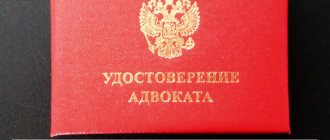Defense in cases of crimes against family and minors
The main task of defending crimes against family and minors is to prevent “excesses” on the part of the state represented by the law enforcement system, so that acts, although they have illegal characteristics, are classified correctly, so that an innocent person is not illegally prosecuted. Such provocations of law enforcement agencies and social activists who send a minor whose appearance clearly does not correspond to his age to test purchase alcoholic beverages, overzealousness on the part of social protection authorities, unfortunately, this does occur, but a criminal lawyer will provide protection for crimes against family and minors and in such cases.
Lawyer for crimes against family and minors
A criminal lawyer, when accused of committing a crime against family and minors, under any of the articles of this chapter of the Criminal Code, is necessary at the earliest stage of criminal prosecution. It is best if you seek the help of a criminal lawyer when the case has not yet been initiated and an investigation is being carried out in accordance with Art. 144-145 of the Code of Criminal Procedure of the Russian Federation, then the chances of a favorable outcome increase and will definitely not be missed. However, if a case has already been initiated against you or your relative, it is never too late to seek the help of a criminal lawyer. A lawyer for crimes against family and minors will provide you with protection from criminal prosecution at any stage of the process; the only thing necessary for successful defense is the client’s trust in the lawyer.
If trouble suddenly comes to you or your relatives, do not despair, there is a way out, call a criminal lawyer at the phone number listed on the site, give yourself or your loved one a chance!
To be consistent in our presentation, it is necessary to give the meaning of the basic concepts of the group of crimes under consideration, namely (as follows from the title) such categories are “family” and “minor”.
For objective reasons, the modern concept of “family” is most clearly explained through the prism of family law, in which it is basic, but even here it remains debatable. Despite the fact that the legislator does not define the concept of family, its meaning and primary importance is conveyed through absolutely all provisions of the Family Code[1].
The concept of family is sociological, not legal in nature. The family is defined as the free, private and inviolable primary unit of society[2]. In legal acts, and, above all, in the RF IC, the concept of family is associated with the establishment of the circle of family members who form its composition.
In Russian legal doctrine, a family is defined as a circle of persons bound by personal non-property, as well as property rights and obligations based on marriage, kinship and the adoption of children for upbringing[3].
According to the definition of Art. 23 of the International Covenant on Civil and Political Rights, the family is and remains the natural and fundamental unit of society, entitled to protection by society and the state.
Actually, this is also enshrined in the Russian Basic Law - in Part 2 of Article 7 of the Constitution of the Russian Federation[4] it is stated that “in the Russian Federation... state support for the family, motherhood, paternity and childhood is provided...” Paragraph 1 of Article 38 of the Constitution of the Russian Federation declares, that “motherhood and childhood, the family are under the protection of the state.” “Childhood” here can be safely identified with the concept of “minority”, and what we will say below.
These principles serve as the basis for the adoption by the state, represented by its authorized bodies, of measures to protect the interests of the family, mother and child, legal mechanisms for such protection, aimed at creating a healthy family, society, and the state as a whole.
Norms aimed at implementing these principles are enshrined in the vast majority of branches of Russian legislation: civil, family, labor, and, of course, criminal.
The term “child” (read “minor”) means any child, regardless of whether his parents were married or not (Article 2 of ILO Convention No. 103). According to Article 1 of the Convention on the Rights of the Child[5], “a child is every human being under the age of 18 unless, under the law applicable to the child, he or she reaches majority earlier.” Russian legislation, primarily family legislation, defines a child as a person who has not reached the age of eighteen years (the age of majority) (Clause 1.Article 54 of the RF IC). 18 years is the age of civil majority under Russian law - from this date a person is considered fully capable, an adult. However, in the case where a child is recognized as fully capable before reaching the age of majority, including in the event of his emancipation, this does not affect, except in cases specified in the law, the possibility of considering him as a child. The period from birth to the age of 18 can be safely called the period of “ childhood.
».
As you can see, civil, family and criminal legislation define a single age criterion for independence, legal capacity, and the age at which a person bears responsibility for his unlawful actions and inactions. Thus, Article 60 of the Constitution of the Russian Federation[6] stipulates that “a citizen of the Russian Federation can independently exercise in full his rights and obligations from the age of 18.” The Civil Code of the Russian Federation also connects the onset of legal capacity with reaching the age of 18, establishing: the ability of a citizen to acquire and exercise civil rights through his actions, create civil responsibilities for himself and fulfill them (civil capacity) arises in full with the onset of adulthood, that is, upon reaching the age of eighteen (Clause 1 of Article 21 of the Civil Code of the Russian Federation).
In the Federal Law of June 24, 1999 No. 120-FZ “On the fundamentals of the system for the prevention of neglect and juvenile delinquency” [7] (as amended on January 13, 2001, July 7, 2003, June 29, August 22, 1, December 29, 2004, April 22, 2005) a minor is defined as a person who has not reached the age of eighteen.
Criminal law considers a minor citizen from two positions, namely:
1) in matters of committing a crime and imposing punishment (Chapter 14 of the Criminal Code of the Russian Federation), persons who at the time of committing the crime were fourteen years old, but not eighteen years old (Part 1 of Article 87 of the Criminal Code of the Russian Federation) are recognized as minors. A more vague definition of a minor is given in the so-called. international “Beijing Rules”[8] - rule 2.2. states: a minor is a child or young person who, under the existing legal system, can be held accountable for an offense in a form that is different from the form of responsibility applicable to an adult. According to the rules, age limits will depend on and will be expressly subject to the provisions of each legal system, thereby taking full account of the economic, social, political, cultural and legal systems of the Member States. Therefore, the concept of “minor” covers a wide age range from 7 to 18 years or older. Such a wide range is inevitable given the diversity of national legal systems and does not detract from the significance of these Standard Minimum Rules.
The minimum age of criminal responsibility varies and is determined depending on the historical and cultural characteristics of a particular country. So, before the revolution in Russia, a young person was considered a minor until he reached the age of 21. In many foreign countries, this is the age criterion of majority that still applies[9]. And here it is necessary to emphasize that establishing the limits of the age of criminal responsibility is a legal criterion for determining the child’s ability to bear the moral and psychological aspects associated with criminal responsibility, that is, in determining the possibility of bringing the child, due to the individual characteristics of his or her perception and understanding, to responsibility for clearly antisocial behavior.
2) if a minor is a victim, then his age is limited to eighteen years without a lower age limit, i.e. from birth. It is in this understanding that we will consider minors in our work.
The Criminal Code of the Russian Federation combines crimes against family and minors into a separate chapter (20th). This allocation is one of the forms of implementing the constitutional principles of protecting the interests of family and childhood. So, today Chapter 20 of the Criminal Code of the Russian Federation consists of seven articles:
Article 150. Involvement of a minor in the commission of a crime
Article 151. Involving a minor in committing antisocial acts
Article 153. Substitution of a child
Article 154. Illegal adoption
Article 155. Disclosure of the secret of adoption
Article 156. Failure to fulfill obligations to raise a minor
Article 157. Malicious evasion of payment of funds for the maintenance of children or disabled parents
Since in most articles the victims, as a rule, are minors (children), the chapter as a whole can be designated as “anti-juvenile” crimes - by analogy with juvenile crime.
Let us denote the elements of the crime common to all crimes - more specifically the composition of each crime will be discussed below.
The generic object of all the crimes under consideration are social relations that ensure the normal development and upbringing of minors and the protection of the family.
The objective side in most cases consists of taking active actions. The exception is failure to fulfill the duties of raising a minor and malicious evasion of payment of funds for the maintenance of children or disabled parents, which can be committed through inaction.
The subjective side of a crime is always direct intent.
The subject of the crime is a sane person who has reached 16 years of age. In some compositions - a special subject.
Only one twentieth chapter of the criminal law, of course, is not capable of independently guaranteeing the protection of the interests of minors and the interests of the family. Therefore, the rules concerning minors are found both in the general and in the special part of the criminal law, as well as in acts from other areas of law.
Just a few months ago, the country's news outlets wrote about the trial of a recidivist pedophile from Ulyanovsk, who, having served time after term for raping minors, was freed and was engaged in the production of pornographic films with the participation of minors. Moreover, being HIV-infected, he endangered the lives and health of children by engaging in indecent acts of a sexual nature with them. The criminal was sentenced to 13 years in prison.
Such examples confirm that the criminal code also provides for liability for other crimes that impinge on the normal development of minors. Thus, Article 134 of the Criminal Code provides for liability for sexual intercourse and other actions of a sexual nature with a person under 14 years of age, and Article 135 for indecent acts against such a person. In a number of crimes, minority is a qualifying or especially qualifying circumstance. These are: torture of a minor (clause “d”, part 2 of article 117), infection with a venereal disease (part 2 of article 121), infection with HIV infection (part 3 of article 122), kidnapping (clause “ d" part 2 of article 126), unlawful deprivation of liberty (clause "d" part 2 of article 127), rape (clause "d" part 2 of article 131), rape of a victim under 14 years of age age (clause "c" part 3 of article 131), violent acts of a sexual nature against a minor (clause "d" part 2 of article 132) and similar actions against a person under 14 years of age (clause .“c” part 3 of article 132), abuse of powers by private notaries and auditors (part 2 of article 202), taking a minor as a hostage (clause “e” of part 2 of article 206), inducing a minor to consume narcotic drugs or psychotropic substances (clause “c” of Part 2 of Article 230)[10].
In general, all crimes of the chapter under consideration can be divided into two groups: crimes against minors (Articles 150, 151, 156) and crimes against the family (Articles 153, 154, 155, 157). This group division is given by A.I. Rarog[11]. Other authors divide crimes into three groups:
1) crimes promoting antisocial activities of minors – Articles 150, 151;
2) crimes encroaching on the freedom of a minor - Art. 153;
3) crimes encroaching on the protection of the family and the creation of the necessary conditions for the maintenance and upbringing of minors - Articles 154-157.
In our opinion, it is enough to divide crimes into two groups according to the objects of encroachment - the interests of the minor and the interests of the family as a whole (which does not exclude encroachment on the interests of the minor).
We consider it important to pay attention to the following. The placement of the new twentieth chapter of the Criminal Code of the Russian Federation in Section VII “Crimes against the Person” is clearly justified, since the crimes included in it encroach on the interests of family members and minors, that is, directly on the rights of the individual. But there is an opinion expressed by E.E. Pukhtiy[12] that the location of the chapter in question in the last place in the section does not fully reflect the social danger of the acts included in it: as a rule, chapters in the Criminal Code of the Russian Federation are located based on the degree of importance of the relevant generic objects, in descending order of their harmfulness. It should be noted that the public danger of crimes against the constitutional rights and freedoms of man and citizen is much less than crimes against family and minors, as evidenced by the sanctions of the articles. Hence the conclusion is drawn that the importance of the values protected by Ch. 20, above.
Moreover, the researcher suggests that the title of the chapter “Crimes against family and minors” can be changed taking into account the use of a more successful application of legislative technique, namely, the chapter can be titled “Crimes against minors and family relations.”
In our opinion, there is logic in this position. Taking into account the consequences of the negative impact of crimes specifically on minors, taking into account the location of the articles in the chapter, it would be possible to put “minors” first in the title of the chapter. The protection of minors, as they are more vulnerable and susceptible to various types of negative impacts, should therefore be given more attention. Minor citizens are the carrier of the gene pool of the nation, its potential, therefore the moral and physical health of this part of the population directly affects the prosperity of the entire society.
In addition, as E.E. Pukhtiy emphasizes, the phrase “crimes against family relationships” more accurately defines the object of one of the two groups of acts included in Chapter. 20.
[1] Family Code of the Russian Federation of December 29, 1995 No. 223-FZ // Collection of legislation of the Russian Federation. — January 1, 1996 - No. 1. — St. 16.
[2] Avakyan S.A. The Constitution of Russia: nature, evolution, modernity: 2nd ed. - M.: RUID, "Sashko", 2000. - SPS "Garant".
[3] See for example: Article-by-article scientific and practical commentary of the Family Code of the Russian Federation / Ed. Erdelevsky A.M. - M., 2001; Korolev Yu.A. Commentary on the Family Code of the Russian Federation - M.: “Legal House “Justitsinform”, 2003 - p. 8.
[4] Constitution of the Russian Federation of December 12, 1993 // Rossiyskaya Gazeta. – December 25, 1993.
[5] Convention on the Rights of the Child (New York, November 20, 1989) // United Nations publication - New York - 1992.
[6] Constitution of the Russian Federation of December 12, 1993 // Rossiyskaya Gazeta. - December 25, 1993.
[7] Federal Law of June 24, 1999 N 120-FZ “On the fundamentals of the system for the prevention of neglect and juvenile delinquency” // Collection of legislation of the Russian Federation. — June 28, 1999 - No. 26. - Article 3177.
[8] United Nations Standard Minimum Rules for the Administration of Juvenile Justice (“Beijing Rules”) (adopted at the 96th plenary meeting of the UN General Assembly on November 29, 1985) // Soviet Justice - 1991, - No. No. 12-14.
[9] See: Russian legislation of the 10th-20th centuries. Legislation of the first half of the 19th century. - T. 6. - M., 1988. - P. 203.
[10] Criminal law course. Volume 3. Special part (edited by Doctor of Law, Professor G.N. Borzenkov, Doctor of Law, Professor V.S. Komissarov) - M.: IKD "Zertsalo-M", 2002
[11] Criminal law of Russia. A special part. Textbook / Under. ed. prof. A.I. Rarog – M.: “Jurisprudence”, 2003.
[12] Pukhtiy, E.E. Crimes against family and minors: Issues of techniques for constructing offenses and differentiation of responsibility: Author's abstract. diss. for academic competition step. Ph.D. legal Sci. 12.00.08 - Kazan, 2004.








